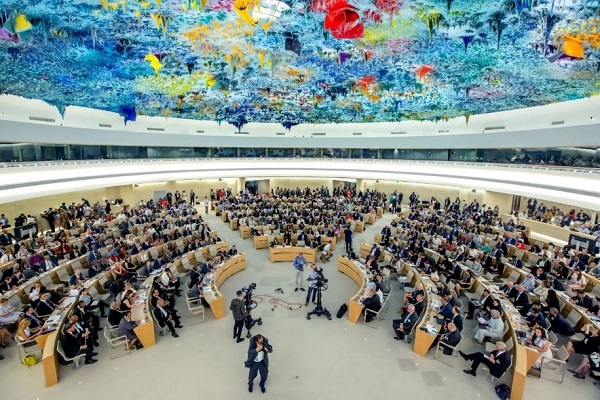Debate on Treatment of Uyghur Muslims Rejected at UN

The United States and allies last month presented the first draft decision targeting China to the UN's top rights body, seeking as a bare minimum a discussion on Xinjiang.
The move came after former UN rights chief Michelle Bachelet released her long-delayed Xinjiang report, citing possible crimes against humanity against Uyghurs and other Muslim minorities in the far-western region.
Western countries thought that by going no further than simply seeking to talk about the findings, they would be able to muster up enough support against blocking it from the agenda.
But in a moment of drama, countries on the 47-member council in Geneva voted 19-17 against holding a debate on human rights in Xinjiang, with 11 nations abstaining.
Amnesty International branded the vote farcical, while Human Rights Watch said it betrayed abuse victims.
In a significant blow to western efforts, Muslim-majority countries and US partners voted against the debate, including Pakistan, Qatar, Sudan, and the United Arab Emirates.
Central Asian states Kazakhstan and Uzbekistan, which share linguistic, cultural and religious ties to Muslims in China’s far western region, also voted against the move. Malaysia and Libya abstained.
The Chinese government initially reacted to the report with the statement: “The so-called ‘assessment’, based on presumption of guilt, uses disinformation and lies fabricated by anti-China forces as its main sources, deliberately ignores authoritative information and objective materials provided by the Chinese government, maliciously distorts China’s laws and policies, denigrates the fight against terrorism and extremism in Xinjiang, and turns a blind eye to the tremendous human rights achievements jointly made by people of all ethnic groups in Xinjiang."
Thursday’s vote represented a victory for Beijing. China's ambassador to the UN, Chen Xu, said the push to discuss the issue was "taking advantage" of the United Nations "to interfere in China's internal affairs".
"The draft decision is not pro-human rights but for political manipulation," he told the council.
"Today China is targeted; tomorrow any other developing country could be targeted."
The draft decision was put forward by the United States; Australia; Canada; France; Germany; Norway; Sweden; and Turkey - among others.
Bachelet's report, published minutes before her term ended on 31 August, highlighted "credible" allegations of widespread torture, arbitrary detention and violations of religious and reproductive rights.
"As the world's largest Muslim country and a vibrant democracy, we cannot close our eyes to the plight of our Muslim brothers and sisters," said Febrian Ruddyard, Indonesian ambassador to the UN.
But, as China did not consent, a discussion "will not yield meaningful progress", hence Indonesia voted "no".
The sentiment was echoed by Qatari Ambassador Hend al-Muftah.
China launched an all-out offensive to dismiss Bachelet's report.



